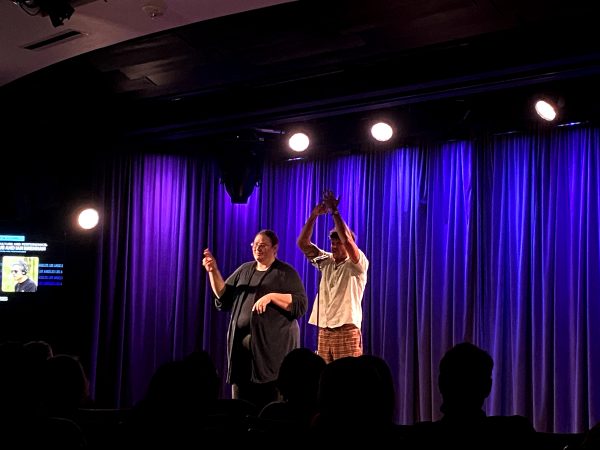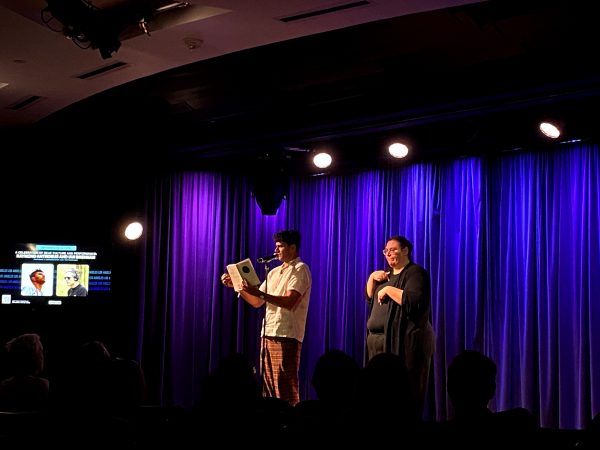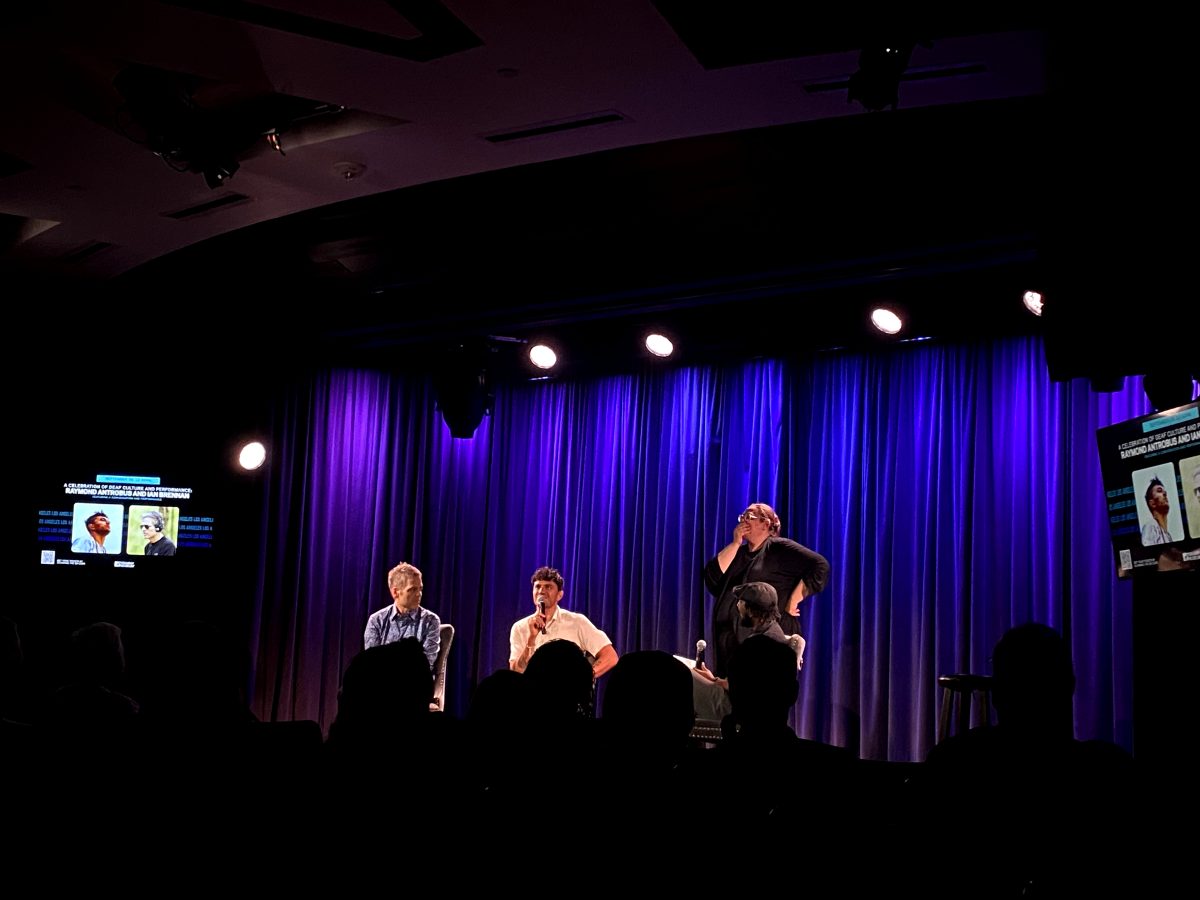The GRAMMY Museum hosted a discussion on Saturday, Sept. 28, featuring award-winning Jamaican-British poet Raymond Antrobus and GRAMMY-winning producer Ian Brennan in celebration of Deaf Awareness Month.
(From left to right) Ian Brennan, Raymond Antrobus and Schyler O’Neal during discussion at GRAMMY Museum’s Clive Davis Theater. Photo by Krystal Guevara.
The discussion, held at the museum’s Clive Davis Theater and was followed by performances from Antrobus. The conversation centered on Antrobus’ relationship to poetry, the speakers’ connection to the disabled community and the overall process of creating their recently-released album “Another Noise.”
Antrobus is a poet, author and educator. He was born in Hackney, London in 1986 to a Jamaican father and English mother. Antrobus received many awards, including the Ted Hughes Award and the 2019 Rathbones Folio Prize.
During the discussion, Antrobus recalled his father’s music and shared musical moments that had a lasting impact on him. He recounts that his father used to build his own sound systems, record his own dubs and speak over his recordings. The poet explains that he was non-verbal as a child. His father, in an effort to draw language from Antrobus, utilized music and poetry. Antrobus’ mother also shared a love for the art form.
He explains that poetry was not something he believed he could make a viable career out of. Antrobus recalled jobs he worked while pretending to have the ability to hear, which led to a cycle of making mistakes, being let go and starting the cycle over again. He lists being a lifeguard and receptionist as a few of the roles he has worked in the past. These experiences helped him realize that pursuing a career in poetry was essential. While poetry played a significant role in his life, he described the actual pivot to poetry as “accidental.”
“That’s kind of a manifestation of [my career], in a way – my deafness and feeling a comfort in this art form,” said Antrobus.
The poet’s work occasionally explores subjects of racism and his experience as a deaf individual.
“That’s been such a blessing to understand that with the art form comes community, comes — in some cases — a mission. It’s not just a thing happening in a vacuum,” said Antrobus.

The second half of the discussion focused on Antrobus’ recently-released spoken word album featuring improvised instrumentals, “Another Noise,” created in collaboration with percussionist Evelyn Glennie — a two-time GRAMMY-winner, —the only deaf person to win a GRAMMY. The album was produced by GRAMMY-winning producer Brennan.
Brennan and Antrobus stressed the importance of authenticity during recording sessions. The theme of authenticity is a common theme throughout Antrobus’ journey of finding his voice through poetry, he often raises this theme “Another Noise” is a live-recorded album, done to capture a raw, authentic quality. The recording process required Antrobus and Glennie to enter the session unaware of what the other would contribute. Glennie’s instrumentals serve as a response to what Antrobus is saying.
“This is a big part of what Glennie has done her whole life and devoted to, is to get people to think about what hearing is. It’s not necessarily with your ears at all, and it’s certainly not just your ears. It’s with your whole body. So much of what affects us is beneath consciousness,” said Brennan. “We’re receiving sound with our feet, with our body and we’re receiving sound in different ways.”
The album has become a deeply personal project for Brennan. He describes his connection to the disabled community through his sister, who was born with Down syndrome, unilateral hearing loss and is non-ambulatory. During the discussion, he highlights the power of music through an anecdote about playing the “Village People” while singing and dancing for his sister, who became non-verbal.
“Over the course of doing this, she’d start moving her one hand, because she had some kind of stroke of some sort. She’s got some weakness on one side. She started moving her hand, and then eventually she’d start clapping,” said Brennan. “And eventually she starts singing non-verbally. And that is the power of music. That’s the power of even a bad pop song, potentially.”
Raymond Antrobus performing at the GRAMMY Museum Clive Davis Theater on Sept. 28. Photo by Krystal Guevara.
The event ended with a performance by Antrobus, who recited his work, including “Perseverance” and “Two Guns in the Sky for Daniel Harris.” His performances captivated the audience, leaving them audibly moved by emotion at the end of each poem.
Antrobus and Brennan provided the audience with a captivating conversation about their art, philosophies and experiences. Both guest speakers engaged well with the audiences — especially through humor — prompting bursts of laughter throughout the event. The discussion , moderated by GRAMMY Museum Sr. Manager of Education and Community Engagement Schyler O’Neal, provided valuable insights about Deaf culture, art and the power of sound.

“I think that our goal is really to make this place be a reflection of our community,” said O’Neal. “I think that an event like this shows just how universal music is, no matter who the individual is or what the circumstances may be.”
Walela Nehanda — a fellow poet who knows Antrobus — said, “I really enjoyed this event. I think it was a really beautiful integration of different ways of being able to experience not just poetry, but sound.”
Among those in attendance was Namaka Auwae-Dekker, a Seattle, Washington resident who works with special needs students and stumbled upon the event spontaneously on her way out of the museum.
“I think this event has a very profound impact, showing not only people with disabilities, but people with disabilities outside of their disability, and I think that’s really powerful,” said Auwae-Dekker.
The GRAMMY Museum frequently holds artist events, with tickets available through their website. Their artist lineup features a diverse group of artists from a variety of musical genres.
Antrobus’ spoken-word album, “Another Noise,” featuring Glennie and produced by Brennan is available on Apple Music, Youtube, and Bandcamp. Brennan also recently published a new book titled “Missing Music: Voices from Where the Dirt Roads End,” about his journey in offering a musical platform to underrepresented, marginalized people found on Amazon.






